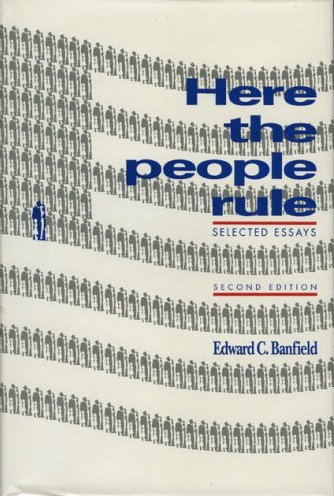New York: Plenum Press, 1985. Washington, D.C.: American Enterprise Institute, 1991.
This book of essays includes Edward C. Banfield’s most important insights into the American political system.
“What Banfield has done…has been to challenge the central tenet of Progressive thought in America, namely, that society could and should be rationalized (and for some, moralized) by government action… In the essays collected here, [Banfield] sets out the limits of science and human reason more generally, especially as those limits need to be understood if we are to prudently serve the ultimate political goal, whch is to ‘afford every person a real opportunity to live a life that is fully human.'” — James Q. Wilson
Table of Contents:
PART I. COMPROMISE AND REFORM
1. Federalism and the Dilemma of Popular Government
2. In Defense of the American Party System
3. Party “Reform” in Retrospect
PART II. DEMOCRATIC POLICYMAKERS
4. Making a New Federal Program
5. Evaluating a Federal Program
6. Revenue Sharing in Theory and Practice
PART III. POLITICS VERSUS ADMINISTRATION
7. Policy Science as Metaphysical Madness
8. Corruption as a Feature of Governmental Organization
9. Ends and Means in Planning
10. The Training of the Executive
PART IV. THE CAPACITIES OF LOCAL GOVERNMENT
11. The Political Implications of Metropolitan Growth
12. The City and the Revolutionary Tradition
13. A Critical View of the Urban Crisis
14. The Zoning of Enterprise
PART V. THREE PROBLEMS FOR DEMOCRACY
15. Present Orientedness and Crime
16. How Many, and Who, Should Be Set at Liberty?
17. The Dangerous Goodness of Democracy
PART VI. POLITICAL ECONOMIZING
18. Some Alternatives for the Public Library
19. Economic Analysis of Political Problems
20. Are Homo Economicus and Homo Politicus Kin?
Online:
AEI [pdf]
Springer Link
Amazon

